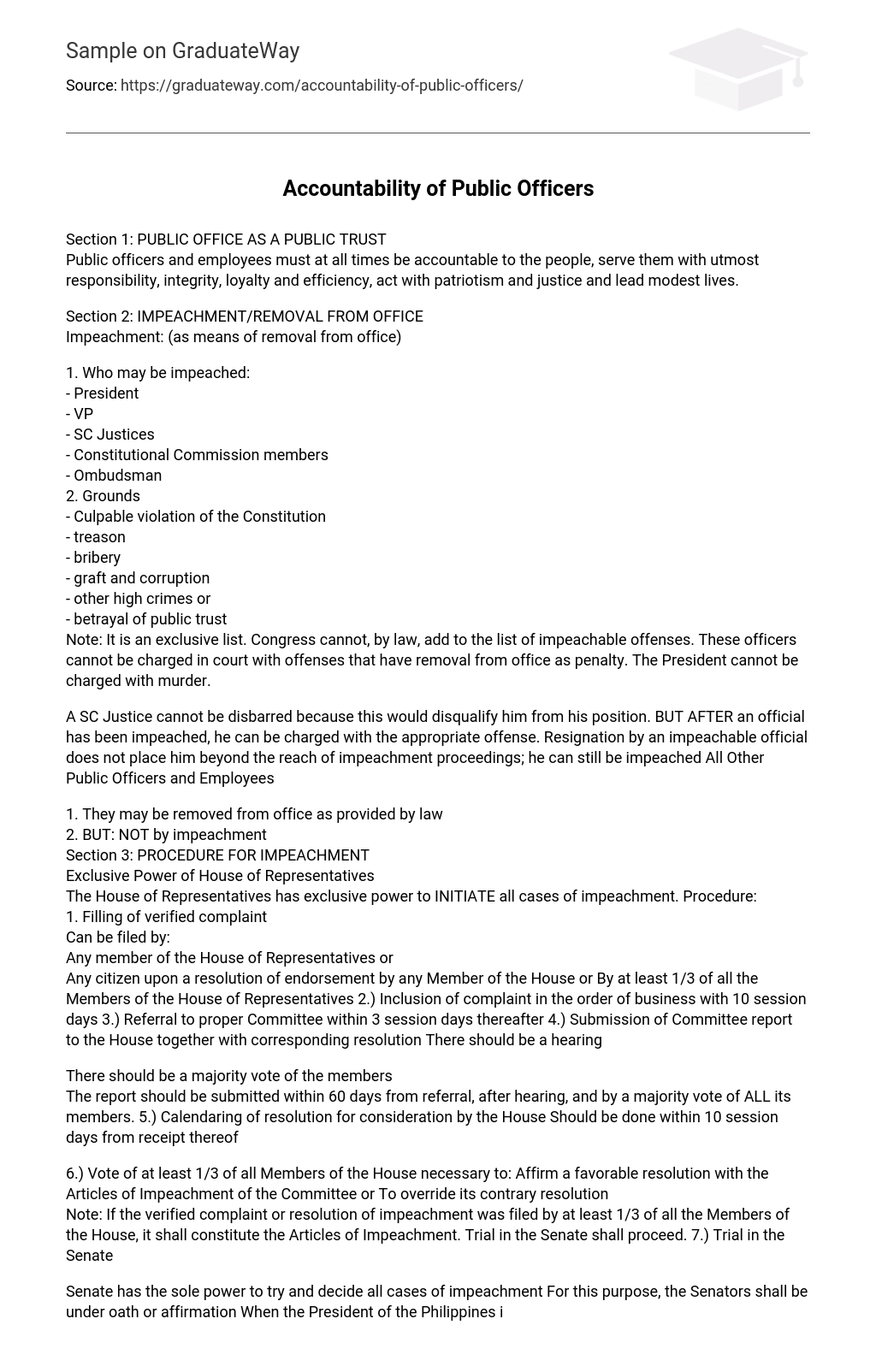PUBLIC OFFICE AS A PUBLIC TRUST
Public officers and employees must at all times be accountable to the people, serve them with utmost responsibility, integrity, loyalty and efficiency, act with patriotism and justice and lead modest lives.
IMPEACHMENT/REMOVAL FROM OFFICE
Impeachment: (as means of removal from office)
Who may be impeached:
- President
- VP
- SC Justices
- Constitutional Commission members
- Ombudsman
Note: It is an exclusive list. Congress cannot, by law, add to the list of impeachable offenses. These officers cannot be charged in court with offenses that have removal from office as penalty. The President cannot be charged with murder.
A SC Justice cannot be disbarred because this would disqualify him from his position. BUT AFTER an official has been impeached, he can be charged with the appropriate offense. Resignation by an impeachable official does not place him beyond the reach of impeachment proceedings; he can still be impeached All Other Public Officers and Employees
- They may be removed from office as provided by law
- BUT: NOT by impeachment
RECOVERY OF ILL-GOTTEN WEALTH
Prescription, Laches, Estoppel
- The right of the State to recover properties unlawfully acquired by public officials and employees from them or from their nominees or transferees shall NOT be barred by prescription, laches or estoppel.
- Their right to prosecute criminally these officials and employees may prescribe.
PROHIBITION ON CERTAIN FINANCIAL TRANSACTIONS
Coverage:
This prohibition applies to:
- President
- Vice-President
- Members of the Cabinet
- Members of Congress
- Members of Supreme Court
- Members of Constitutional Commissions
- Ombudsman
- Any firm or entity in which they have controlling interest
Scope of prohibition:
The above mentioned officials cannot obtain, directly or indirectly for BUSINESS PURPOSES:
- Loans
- Guarantees
- Other forms of financial accommodation
From:
- Government owned or controlled banks; or
- Government owned or controlled financial institutions.
If the loan, etc, is NOT for business purpose, e.g. a housing loan, the prohibition does not apply.
Statements of assets, liabilities and net worth
When submitted: Public officer and employee shall submit a declaration under oath of his assets, liabilities and net worth upon assumption of office and as often as required under the law. When declaration shall be disclosed to the public: These declarations shall be disclosed to the public in a manner provided by law in the case of:
- President
- Vice-President
- Members of the Cabinet
- Members of Congress
- Justices of the Supreme Court
- Members of Constitutional Commissions
- Other constitutional offices
- Officers of the armed forces with general or flag rank
Allegiance of public officers and employees
Allegiance to the State and to the Constitution Change in Citizenship/Immigrant Status
Incumbent public officers and employees who seek either:
- Change his citizenship; or
- Acquire immigrant status in another country
- Shall be dealt with by law.
If Philippine citizenship is one of the qualifications to the office, the loss of such citizenship means the loss of the office by the incumbent.
The Election Code provides the rules with respect to non-incumbents, i.e. persons running for elective offices. The Code provides that permanent residents of or immigrant to a foreign country cannot file certificates of candidacy unless they expressly waive their status as such This renunciation must be some other than, and prior to, the filling of the certificate of candidacy.





